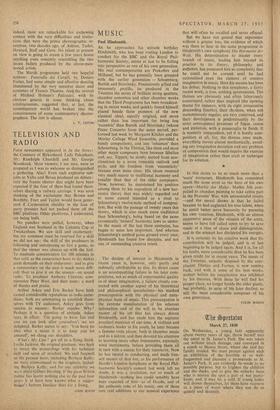TELEVISION AND RADIO
FOUR newcomers appeared in In the News: the Countess of Birkenhead, Lady Pakenham, Mr. Randolph Churchill and Mr. George Woodcock. Most viewers, I am sure, were as prepared as I was to welcome so distinguished a gathering. Alas! Even such explosive sub- jets as as Yalta and Bevan produced no debate: only the frantic chatter that might have been expected if the four of them had found them- selves sharing a railway carriage. I was soon thinking of the excitement that Brown. and Boothby, Foot and Taylor would have gener- ated if Corporation timidity in the face of party pressure had not pushed them off the BBC platform. Other platforms, I understand, are being built.
No punches were pulled, however, when England met Scotland in the Calcutta Cup at Twickenham. We saw skill and excitement: but my comment must be reserved for a skill we did not see: the skill of the producers in • following and anticipating so fast a game, so that•thc viewer was always up with the ball. To maintain concentration for 100 minutes in that cold, as the cameramen have to do, makes great demands on their endurance: and to give a commentary on the seen is much more diffi- cult than to give it on the unseen—on sound radio. To producer Anthony Craxton, com- mentator Peter West, and their team: a word of thanks and praise.
Arthur Askey and Eric Barker have both earned considerable reputations as radio come- dians; both are attempting to establish them- selves with TV audiences. Askey goes from success to success: Barker recedes. Whyi Perhaps it is a question of attitude. Askey says, in effect : 'I'm going to have fun and you lot can look after yourselves'; we are delighted. Barker seems to say: 'You have no idea what a strain it is to keep you lot amused'; we shrug our shoulders.
JOHN IRWIN


































 Previous page
Previous page